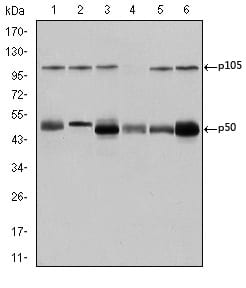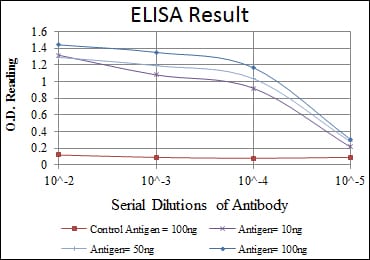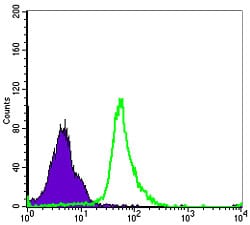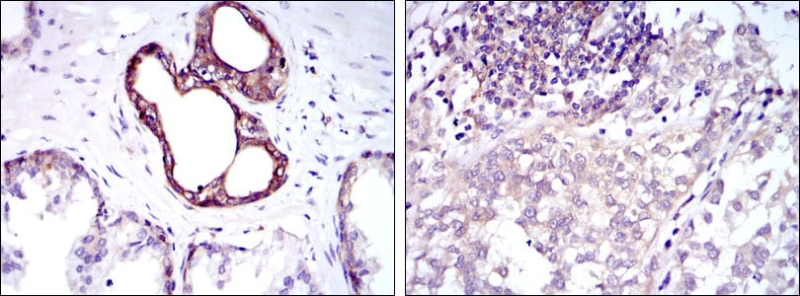



| WB | 1/500 - 1/2000 | Human,Mouse,Rat |
| IF | 咨询技术 | Human,Mouse,Rat |
| IHC | 1/200 - 1/1000 | Human,Mouse,Rat |
| ICC | 技术咨询 | Human,Mouse,Rat |
| FCM | 1/200 - 1/400 | Human,Mouse,Rat |
| Elisa | 1/10000 | Human,Mouse,Rat |
| Aliases | p50; KBF1; p105; EBP-1; MGC54151; NFKB-p50; NFkappaB; NF-kappaB; NFKB-p105; NF-kappa-B |
| Entrez GeneID | 4790 |
| clone | 5D10 |
| WB Predicted band size | 50kDa/105kDa |
| Host/Isotype | Mouse IgG2a |
| Antibody Type | Primary antibody |
| Storage | Store at 4°C short term. Aliquot and store at -20°C long term. Avoid freeze/thaw cycles. |
| Species Reactivity | Human |
| Immunogen | Purified recombinant fragment of human NFKB1 expressed in E. Coli. |
| Formulation | Ascitic fluid containing 0.03% sodium azide. |
+ +
以下是关于NFKB1抗体的3篇参考文献及其简要摘要:
1. **"NF-κB1 (p50) homodimers differentially regulate pro- and anti-inflammatory cytokines in macrophages"**
- **作者**: T. Lawrence 等
- **摘要**: 该研究利用NFKB1抗体通过染色质免疫沉淀(ChIP)和Western blot技术,揭示了NFKB1同源二聚体在巨噬细胞中调控促炎和抗炎细胞因子的双向作用,强调其在炎症反应中的动态平衡功能。
2. **"A critical role for NF-κB1 in TLR-induced systemic inflammation"**
- **作者**: S. Li 等
- **摘要**: 通过敲除小鼠模型和NFKB1抗体免疫组化分析,证明NFKB1在TLR信号通路中驱动全身性炎症反应,其缺失导致关键炎症因子(如TNF-α、IL-6)表达显著下降。
3. **"Dysregulation of NFKB1 protein stability drives colorectal cancer progression"**
- **作者**: M. Wang 等
- **摘要**: 研究使用NFKB1抗体进行组织微阵列和免疫印迹检测,发现结直肠癌中NFKB1蛋白稳定性异常升高,促进肿瘤细胞增殖和转移,提示其作为潜在治疗靶点。
以上文献均通过NFKB1抗体探究了该蛋白在免疫调控、炎症及癌症中的分子机制,覆盖基础研究与疾病模型应用。
**Background of NFKB1 Antibodies**
NFKB1 (nuclear factor kappa B subunit 1) is a critical component of the NF-κB transcription factor family, which regulates genes involved in immune responses, inflammation, cell survival, and proliferation. The NFKB1 gene encodes the p105 precursor protein, which is processed into the mature p50 subunit. p50 forms homodimers or heterodimers (e.g., with RelA/p65) to bind DNA and modulate target gene expression. In resting cells, NF-κB complexes are sequestered in the cytoplasm by inhibitory proteins like IκB. Upon stimulation (e.g., cytokines, pathogens, or stress signals), IκB is degraded, allowing NF-κB translocation to the nucleus.
NFKB1 antibodies are essential tools for studying the expression, localization, and function of the p50/p105 proteins. These antibodies are widely used in techniques such as Western blotting, immunohistochemistry (IHC), immunofluorescence (IF), and chromatin immunoprecipitation (ChIP). They help researchers investigate NF-κB signaling dysregulation in diseases like cancer, autoimmune disorders, and chronic inflammation. Commercial NFKB1 antibodies are often validated for specificity against recombinant proteins or cell lines with NFKB1 knockout.
Antibody selection depends on the target epitope (e.g., N-terminal, C-terminal, or phosphorylated sites) and application requirements. For example, antibodies recognizing the N-terminal region of p50 are ideal for detecting active NF-κB dimers, while those targeting the C-terminal ankyrin-repeat domain of p105 may distinguish precursor forms. Proper validation ensures accurate detection, as cross-reactivity with other NF-κB subunits (e.g., p52 from NFKB2) can occur. Understanding NFKB1’s role in cellular pathways and disease mechanisms continues to drive the development and application of these antibodies.
×